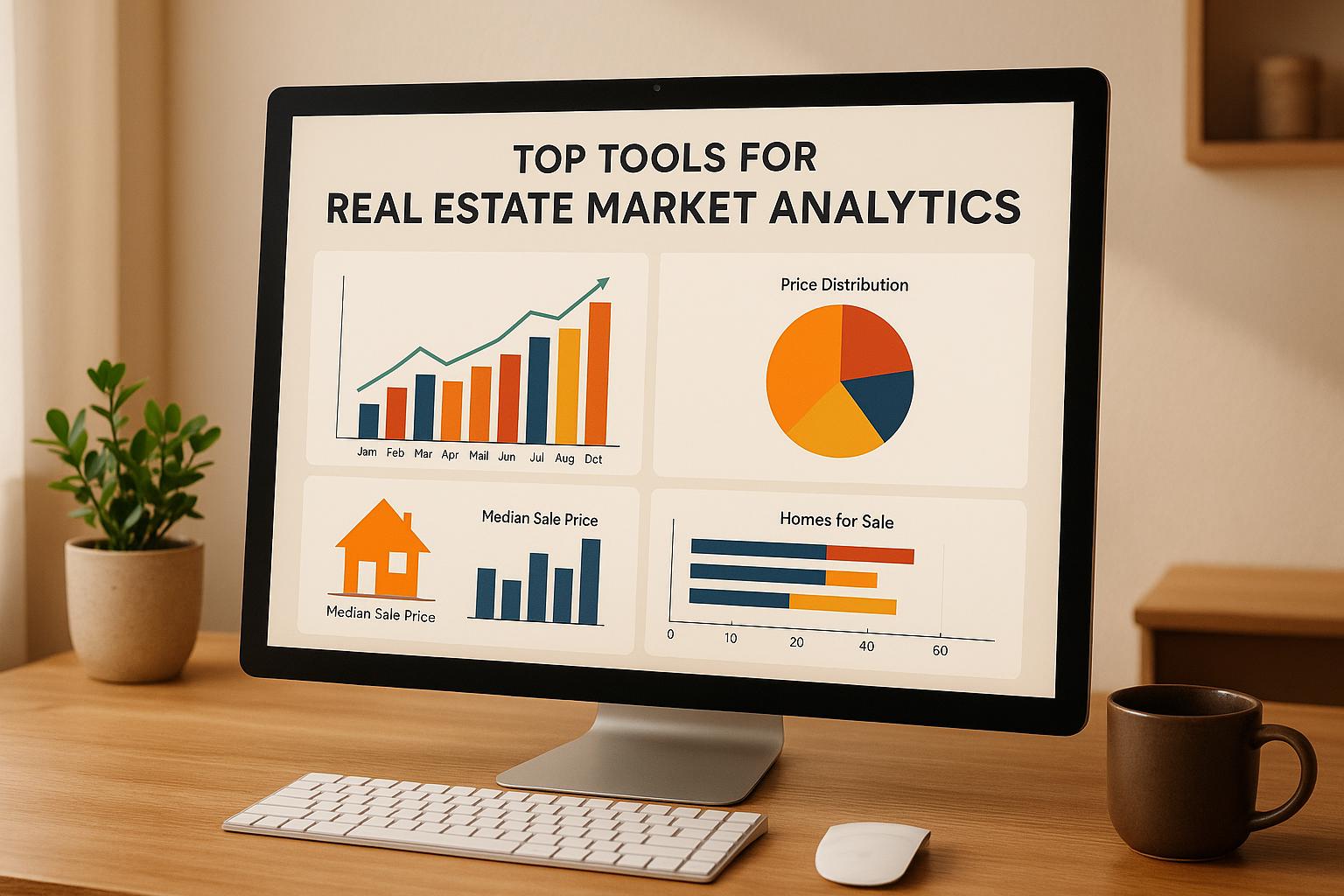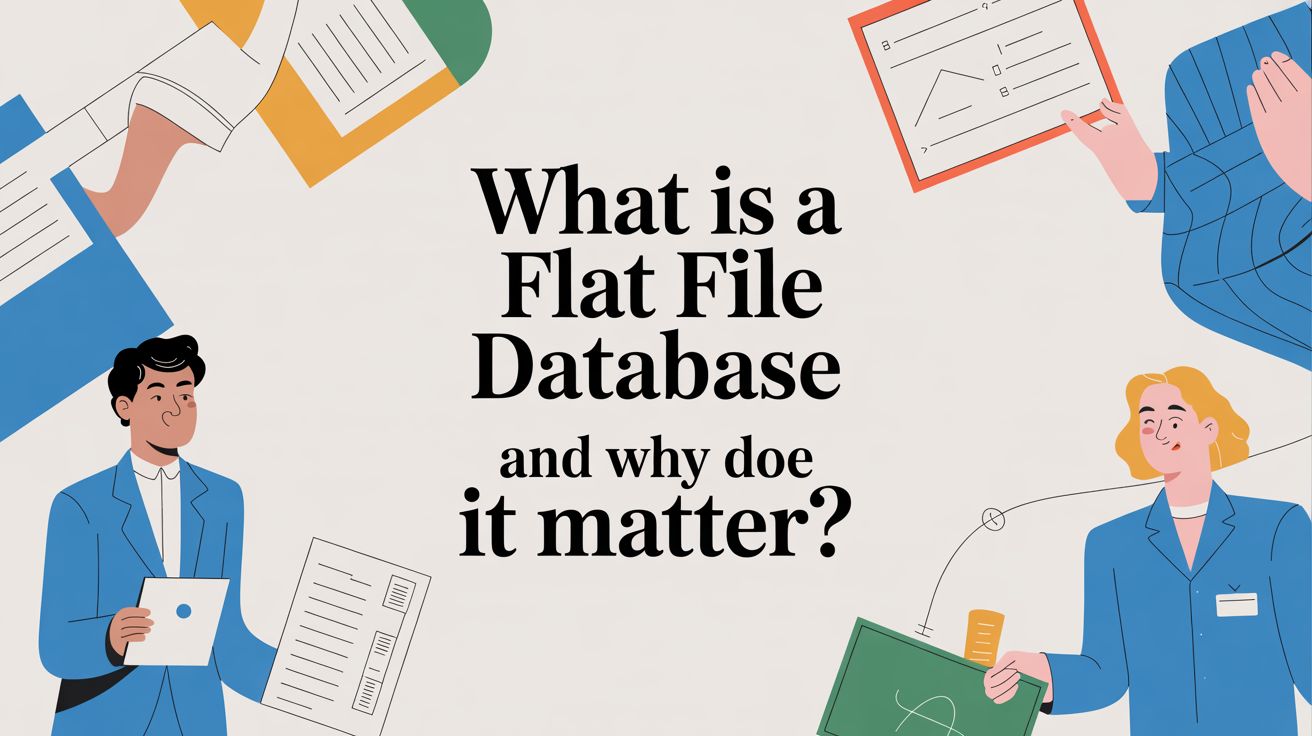Real estate professionals today rely heavily on data analytics to make informed decisions. The right tools can help you analyze market trends, forecast changes, and identify opportunities across residential and commercial properties. Here’s a quick overview of the top platforms:
- BatchData: Focuses on property data enrichment, skip tracing, and contact information with flexible pay-as-you-go pricing.
- CoStar Market Analytics: Specializes in commercial real estate with a vast database of property and market trends, offered via subscription.
- Reonomy: Provides detailed commercial property ownership and transaction data, ideal for prospecting and market analysis.
- HouseCanary: Uses AI to deliver residential property valuations and granular market forecasts tailored for institutional investors and lenders.
- Yardi Matrix: Targets the multifamily housing market, offering rent trends and performance metrics.
- PropertyShark: Covers both residential and commercial properties with detailed ownership, tax, and historical data.
Each platform serves specific needs, from commercial market analysis to residential property valuations. Below is a quick comparison to help you choose the best tool for your goals.
Quick Comparison
| Tool | Data Focus | Best For | Pricing Model | Integration Options |
|---|---|---|---|---|
| BatchData | Property data, contact enrichment | Investors, agents, developers | Pay-as-you-go/custom | Developer-friendly APIs |
| CoStar | Commercial property trends | Commercial investors, brokers | Subscription-based | Limited third-party integrations |
| Reonomy | Ownership and transaction data | Prospecting, market analysis | Subscription tiers | CRM integrations, API access |
| HouseCanary | Residential valuations, forecasts | Institutional investors, REITs | Custom pricing | Robust API, white-label options |
| Yardi Matrix | Multifamily housing metrics | Multifamily investors, brokers | Subscription-based | Integrates with Yardi systems |
| PropertyShark | Property records, ownership data | Investors, developers | Subscription plans | API access, limited CRM support |
Whether you’re a commercial broker, an institutional investor, or a residential agent, understanding your specific needs will help you pick the right tool. Focus on features like data depth, integration capabilities, and pricing flexibility to find the best fit.
5 Best Property Data Software Providers: Real Estate Investors, Agents & Wholesalers (US & UK)
1. BatchData
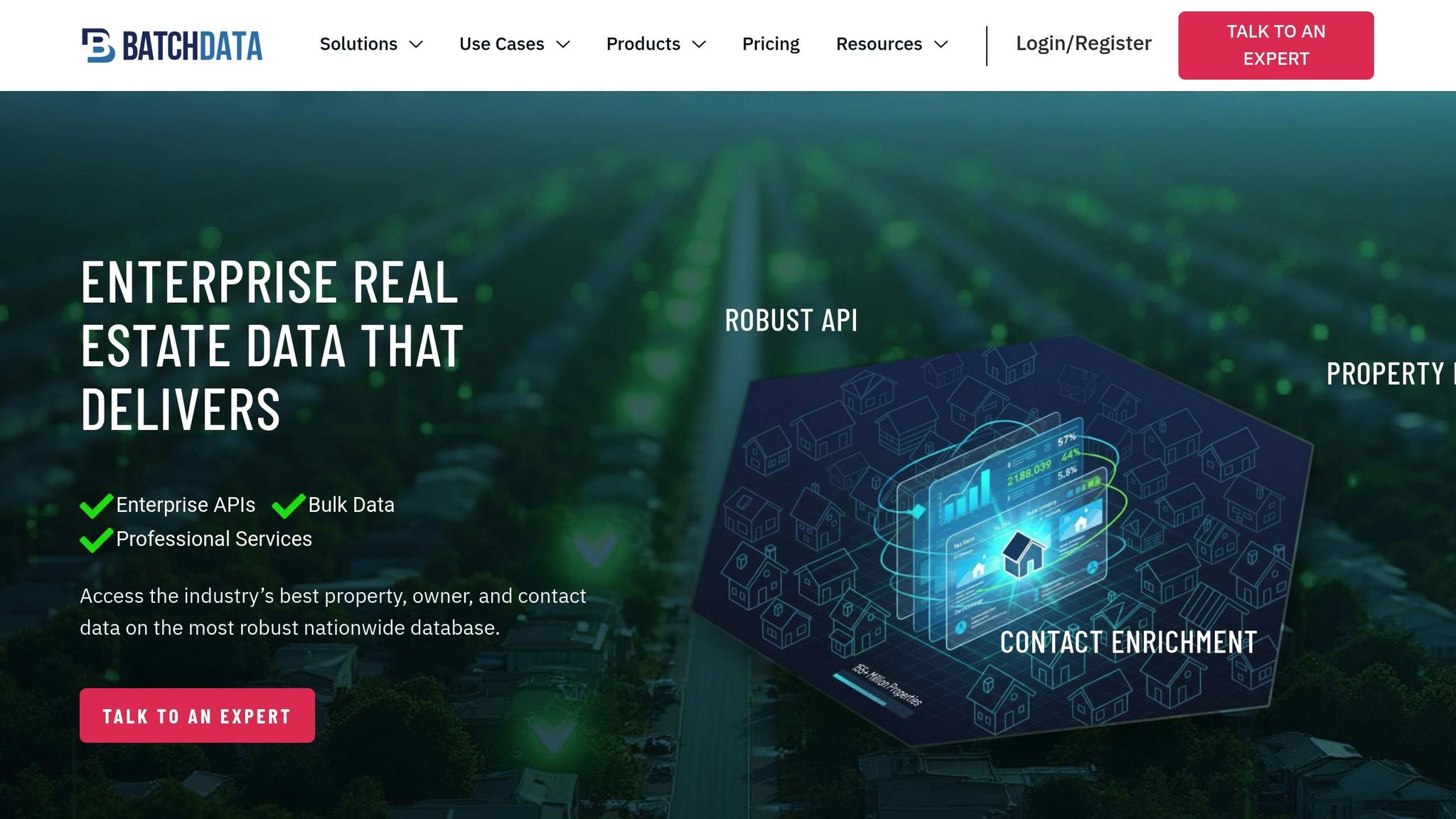
BatchData serves as a go-to resource for real estate professionals, offering a reliable hub for property and contact information. Acting as a central data source, it streamlines market analysis by providing enriched, actionable data to help users make informed decisions.
Data Coverage and Granularity
One of BatchData’s standout features is its ability to provide highly detailed property data. From ownership records and contact details to property characteristics, the platform covers properties across the United States. It specializes in skip tracing and contact enrichment, making it easier for users to pinpoint property owners, investors, and other key stakeholders. This level of detail is especially useful for uncovering investment opportunities and conducting thorough market research.
Primary Focus
BatchData caters to a wide range of real estate needs by covering various property types, including residential, commercial, and multifamily properties. Whether you’re a real estate agent searching for new listings, an investor hunting for off-market deals, or a property manager building a tenant database, BatchData offers tools to combine market insights with effective outreach strategies.
Integration Capabilities
The platform’s API is designed to integrate effortlessly with existing systems. It offers property search APIs, phone verification services, and address verification tools that can be embedded into CRMs, marketing platforms, or custom-built applications. Users can choose between real-time queries and bulk data delivery, ensuring flexibility in how they access and utilize the information.
Pricing and Flexibility
BatchData operates on a pay-as-you-go pricing model, allowing users to pay only for the data they consume – whether that’s individual property lookups, skip tracing, or bulk data downloads. For larger-scale operations, the platform also provides custom solutions with tailored pricing, offering options like bespoke datasets and professional services for seamless data integration.
2. CoStar Market Analytics
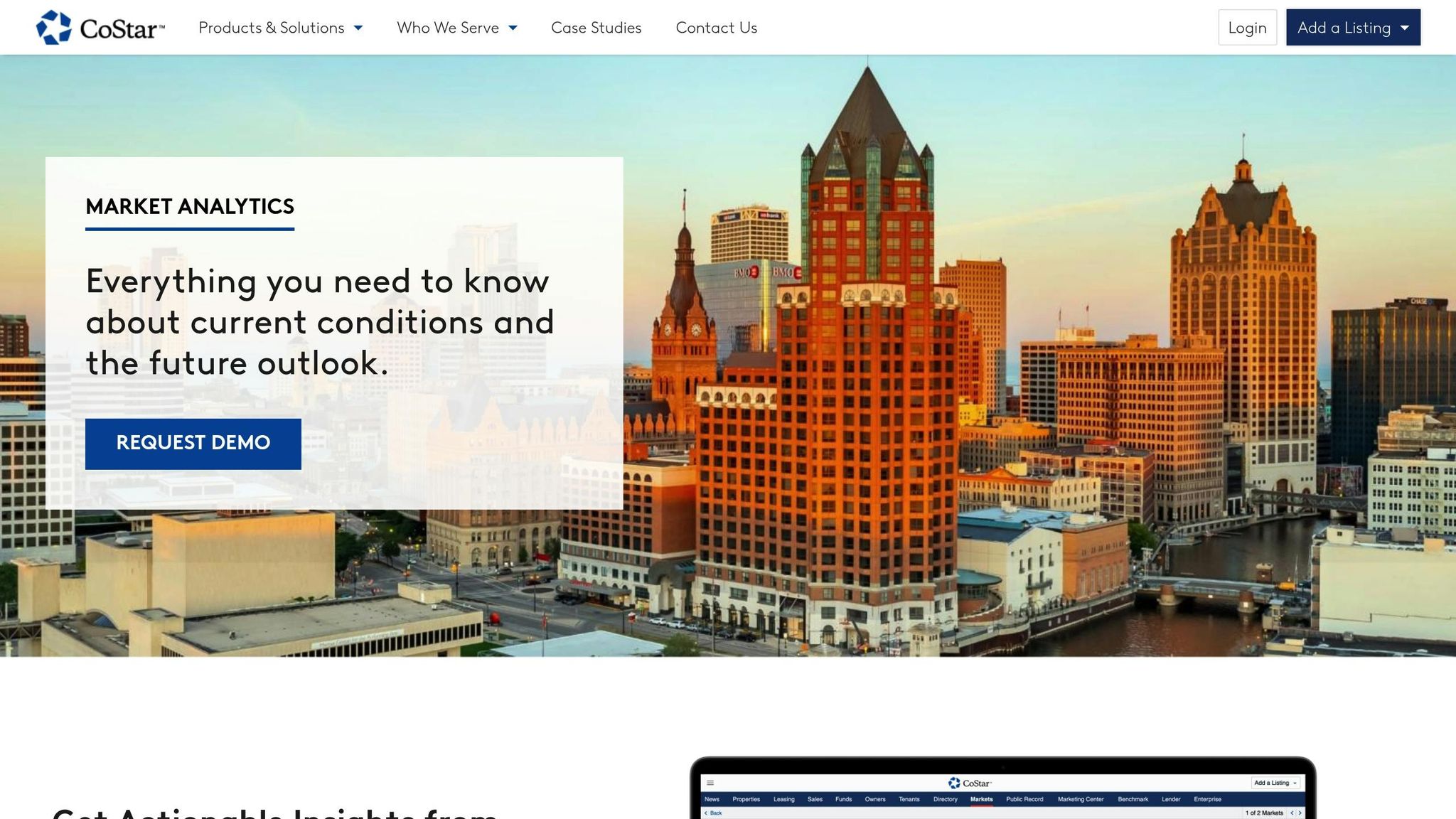
CoStar Market Analytics is a powerful tool tailored for the commercial real estate industry, delivering high-level market insights to support informed decision-making. By combining detailed property data with market trends, it helps professionals navigate investments and leasing activities across various commercial sectors. While it shares some similarities with BatchData, CoStar zeroes in on the commercial real estate market with unmatched depth.
Data Coverage and Granularity
CoStar boasts one of the most extensive U.S. commercial property databases, encompassing millions of properties in key markets. It covers a wide range of property types, including office buildings, retail spaces, industrial facilities, and multifamily units (five or more). Each property profile is packed with valuable details such as ownership records, lease rates, vacancy levels, recent sales, and tenant information.
To ensure data remains accurate and up-to-date, CoStar conducts regular market surveys and inspections. This allows the platform to provide real-time insights on market conditions, rental trends, and property availability. Its analytics even dive into submarket specifics, offering metrics like cap rates, price per square foot trends, and absorption rates for metropolitan areas.
Primary Focus
CoStar’s core strength lies in its ability to analyze commercial real estate trends, making it an essential resource for investment and leasing strategies. It’s particularly useful for professionals involved in investment sales, leasing, and portfolio management. The platform includes specialized modules for net lease, retail, and office properties.
For investors, CoStar’s database of comparable sales and detailed market reports is invaluable for underwriting acquisitions. Leasing agents, on the other hand, benefit from its tenant and occupancy data, which helps them identify new opportunities and stay ahead in competitive markets.
Integration Capabilities
CoStar supports seamless integration with other tools through its API, which allows for real-time access to property searches, market comparisons, and tenant details. This real-time functionality ensures that users can make decisions based on the most current data available. The platform also integrates with popular commercial real estate software, simplifying workflows and enhancing efficiency.
Pricing and Flexibility
CoStar operates on a subscription model, with pricing tailored to factors like user count, feature access, and market coverage. For larger organizations, enterprise-level packages include perks like custom data feeds, dedicated account managers, and specialized training. For those with more localized needs, market-specific subscriptions provide a budget-friendly way to access targeted insights without paying for nationwide coverage.
3. Reonomy
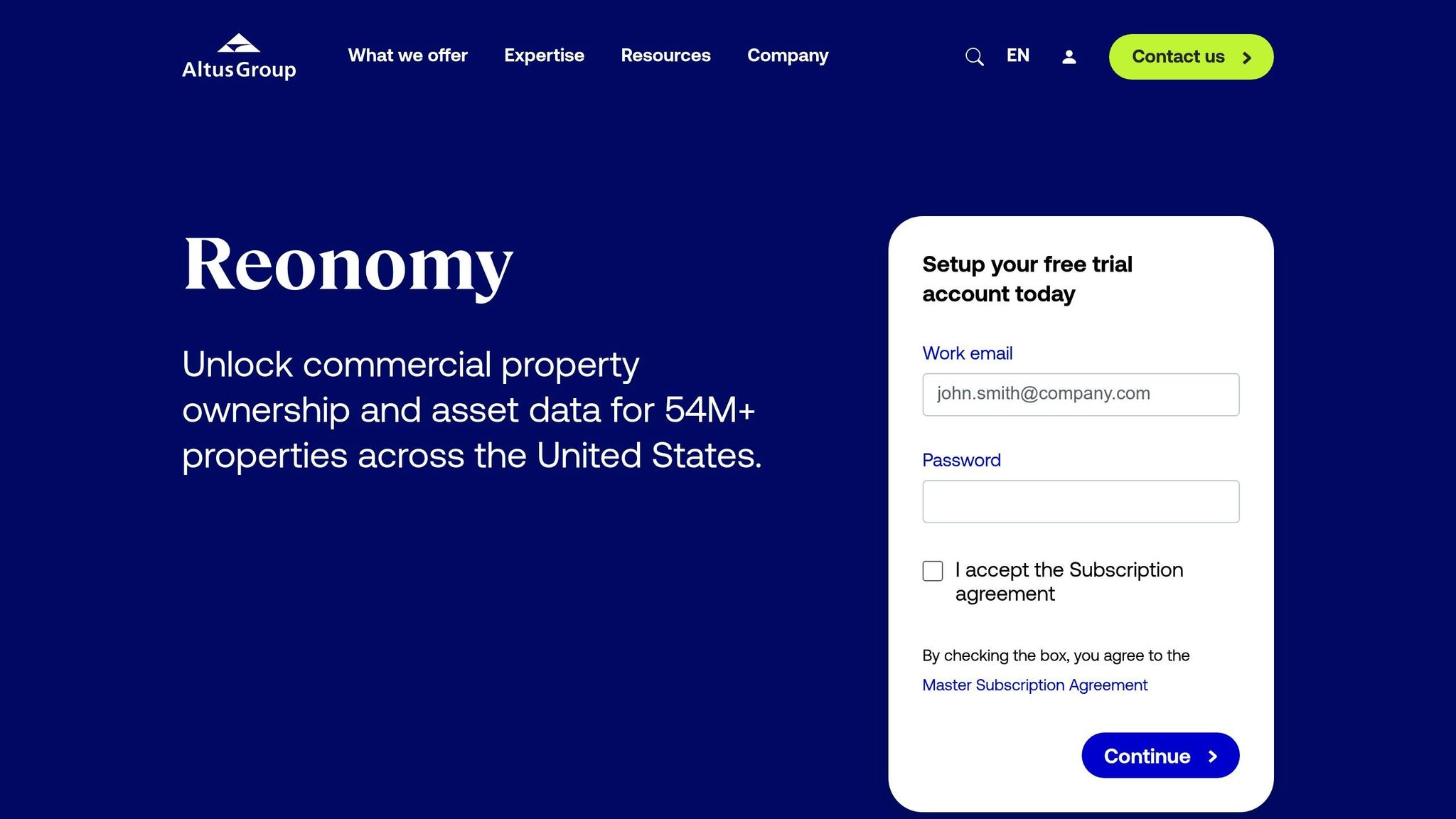
Reonomy stands out as a real estate intelligence platform specializing in commercial property data and ownership details. It’s particularly known for its detailed records on property ownership and contact information, making it a go-to tool for professionals looking to identify decision-makers or track changes in property ownership.
Data Coverage and Detail
Reonomy’s database spans commercial and residential properties across the United States. One of its key strengths is its detailed ownership records, which include both current and historical transaction data. This makes it easy for users to track property transfers and spot investment trends.
The platform delivers a wealth of property details, such as square footage, construction year, zoning classifications, tax assessments, and recent sales data. On top of that, it provides in-depth ownership insights, including profiles of property owners with their contact information, portfolio holdings, and transaction histories. This applies to both individual investors and larger entities like REITs or private equity firms.
Reonomy’s data covers a wide range of property types, including office buildings, retail spaces, industrial facilities, and multifamily housing. The platform consistently updates its database using official county records and other trusted sources, ensuring users have access to accurate and up-to-date information. This robust data foundation supports everything from prospecting to market analysis.
Core Focus
Reonomy is tailored for the commercial real estate sector, catering to professionals involved in acquisitions, dispositions, leasing, and investment sales. It’s particularly useful for identifying and connecting with property owners.
The platform is a valuable tool for prospecting, especially for brokers and investors. Its extensive owner contact database simplifies the process of reaching out to property owners about potential deals. Investment professionals also gain insights into owner portfolios and transaction patterns, helping them uncover off-market opportunities.
For market analysis, Reonomy offers tools to track comparable sales, monitor trends, and evaluate investment activity in specific areas. Its mapping features allow users to visualize property data geographically, making it easier to spot activity clusters or emerging trends.
Integration Options
Reonomy provides API access, enabling users to integrate its property and owner data directly into their CRM systems. This allows for seamless prospecting and custom data feeds tailored to specific markets. The API supports automated data retrieval for large-scale analysis projects, simplifying workflows for teams handling significant volumes of data.
The platform also integrates with popular CRM systems, allowing users to sync property and contact information directly into their existing databases. This ensures teams can work efficiently without switching between platforms.
For larger organizations, Reonomy offers custom data feeds tailored to specific property types or market areas. These feeds help companies maintain up-to-date property and ownership information internally, eliminating the need for manual data entry.
Pricing and Subscription Options
Reonomy uses a subscription-based pricing model, offering plans that range from individual licenses to enterprise-level packages for larger teams.
Costs depend on factors like the number of users, geographic coverage, and access to advanced features such as bulk data exports and API functionality. Enterprise clients can negotiate custom pricing, which may include dedicated support, training, and specialized data delivery options.
The platform offers flexible contract terms, with both annual subscriptions and month-to-month plans available. This flexibility makes Reonomy a practical choice for independent brokers as well as large institutional teams looking for comprehensive market data.
4. HouseCanary
HouseCanary specializes in delivering residential real estate valuations and market forecasts using AI and machine learning. It’s a trusted resource among institutional investors, with 6 of the top 10 Single Family Rental REIT operators and 8 of the top 10 private lenders relying on its data to guide investment decisions.
Data Coverage and Detail
HouseCanary boasts data coverage for over 136 million U.S. properties. This includes single-family homes, condos, and townhouses, ensuring valuations for virtually every residential property in the country.
What sets HouseCanary apart is its block-level granularity. While many providers focus on broader Metropolitan Statistical Area (MSA) data, HouseCanary dives deeper, delivering insights at the block level. This precision allows users to uncover trends in micro-markets that might otherwise go unnoticed.
"I was sold on HouseCanary by the granularity of their data. Most other providers only offer HPI values at the MSA level. HouseCanary’s block-level data, especially at higher loan values, was a big selling point." – California-Based Regional Bank
The platform’s valuation tools are highly accurate, achieving a Median Absolute Percentage Error (MdAPE) of 3.1%. Property valuations consistently fall within a 0% to 3.6% error range, making HouseCanary a reliable choice for high-stakes decisions in investments and lending.
Who It Serves
HouseCanary focuses on the residential real estate sector, catering to institutional investors, lenders, and real estate investment trusts (REITs). It’s especially strong in the single-family rental market, where 4 out of 5 top buyers of residential whole loans on Wall Street use its data for investment analysis.
The platform excels in market forecasting and risk assessment, using AI-powered models to predict property value changes and identify market trends. This is particularly useful for portfolio managers handling large property datasets that require quick, accurate evaluations.
HouseCanary also serves mortgage lenders by providing precise property valuations for loan underwriting. Its image recognition tools analyze property photos to assess condition and features, streamlining the appraisal process. These analytics integrate seamlessly with modern tech systems, improving workflow efficiency.
Integration Capabilities
HouseCanary offers robust API integration through its Analytics, Data Explorer, ComeHome Partner, and Order Manager APIs. These APIs support both single-property queries and bulk data retrieval, handling up to 100 items per request.
To simplify integration, HouseCanary provides sample code in popular programming languages like Python, Java, C#, Ruby, PHP, R, and JavaScript. A recent Q1 2024 update enhanced the Data Explorer API, adding features that allow clients to create, edit, and retrieve reports directly within their systems. The ComeHome Partner API also includes advanced SAML and oAuth support for smoother authentication.
The platform is designed to integrate with major CRM systems, making it easy for real estate professionals to incorporate HouseCanary into their workflows. It has earned a 4.5/5 rating for Integration Capabilities.
Pricing and Contract Options
HouseCanary uses a custom pricing model. API rate limits vary by endpoint, with the Analytics API typically allowing 250 components per minute for self-serve users. Enterprise customers can negotiate higher limits and tailored packages.
The platform offers flexible contract terms, accommodating everyone from individual real estate professionals to large institutional clients. Enterprise clients benefit from customized packages and dedicated support.
sbb-itb-8058745
5. Yardi Matrix
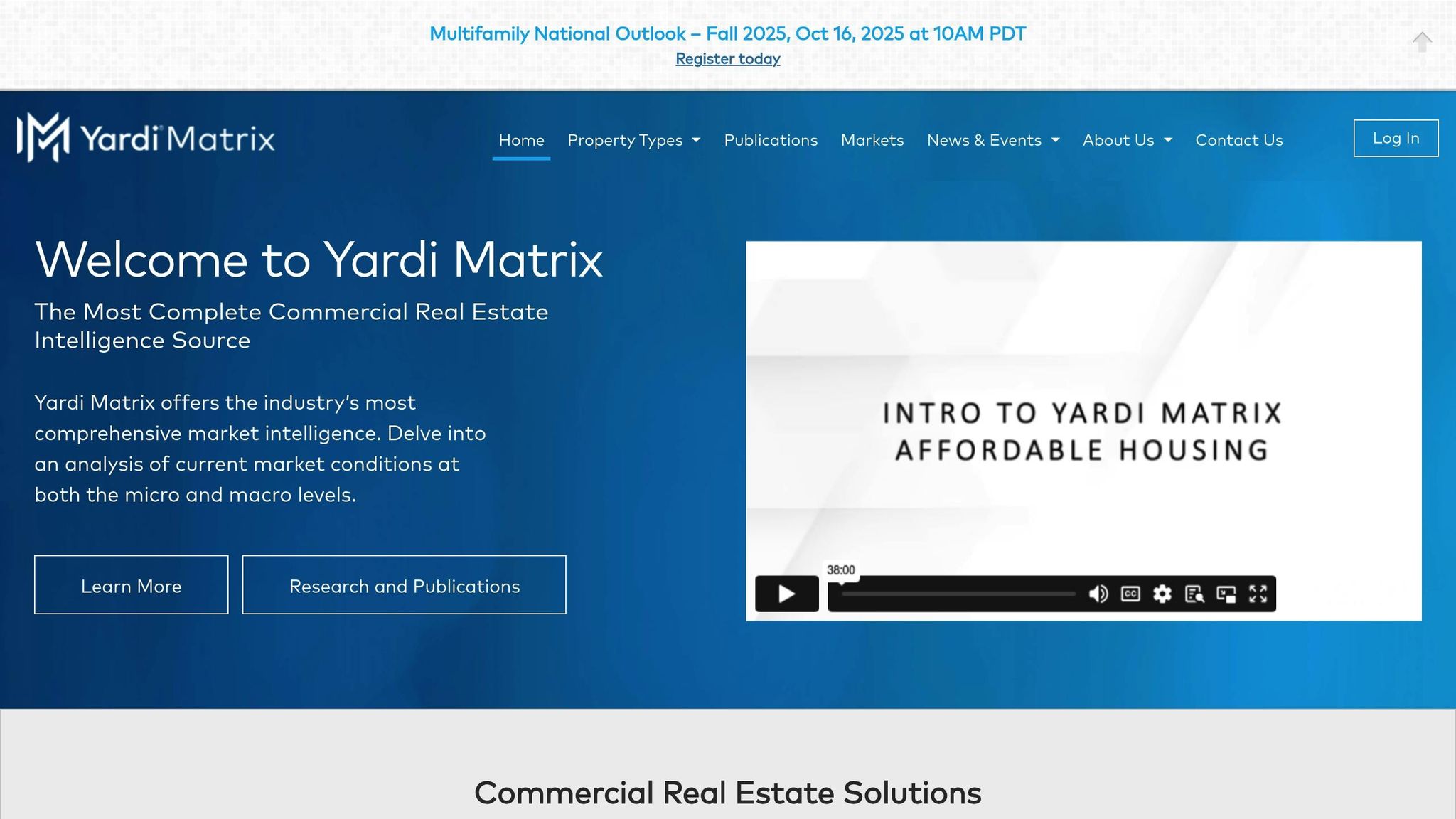
Yardi Matrix stands out as a specialized tool designed specifically for the multifamily housing market. By honing in on this segment, it provides a deeper understanding of market trends and performance metrics that are crucial for navigating the complexities of the rental market.
This platform equips property managers, investors, and brokers with powerful tools to analyze rental trends and compare property performance. With its advanced data integration and detailed reporting features, Yardi Matrix helps users make informed decisions and stay ahead in a competitive market.
6. PropertyShark
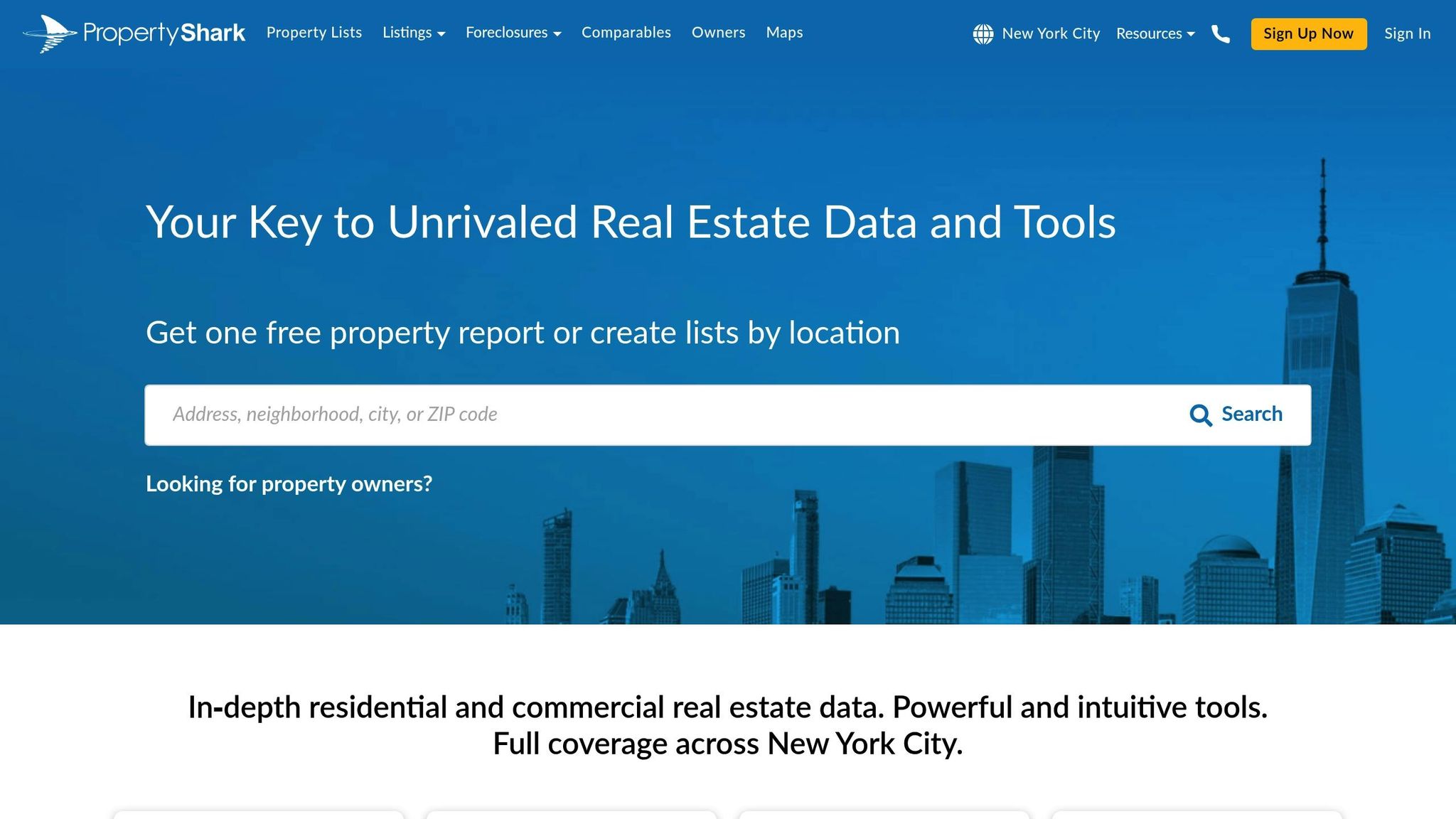
PropertyShark provides in-depth property data designed to support smarter investment and development decisions. By going beyond basic listings, it offers comprehensive insights that help real estate professionals make informed choices.
Primary Focus
PropertyShark caters to both commercial and residential properties, making it a go-to platform for a wide range of real estate professionals. Whether you’re an investor, broker, or developer, the platform consolidates market data to serve your needs.
For instance, if you’re evaluating a residential neighborhood for potential flips or exploring commercial properties for investment, PropertyShark equips you with the data needed to assess opportunities effectively.
Data Coverage and Granularity
PropertyShark excels in delivering detailed property records and historical data, offering a rich context for decision-making. Its extensive database includes key metrics such as property characteristics, ownership history, mortgage details, and building specifications. This level of detail allows users to analyze both current market conditions and historical trends that impact property values.
The platform also offers insights into property taxes, assessed values, and comparable recent sales within specific neighborhoods. Additionally, access to building permit data sheds light on upcoming developments or renovations that could influence local market dynamics.
Integration Capabilities
For users looking to seamlessly incorporate property data into their existing systems, PropertyShark provides API access. This feature allows for integration with analysis tools and CRM platforms, enabling streamlined workflows.
While PropertyShark is primarily a property intelligence tool rather than a full-fledged CRM system, its API functionality supports integration with various business management tools. However, detailed information about direct CRM integrations or broader third-party connectivity options is limited. Users may need to collaborate with their technical teams to set up custom data connections.
Feature Comparison Chart
This chart highlights key metrics – data coverage, focus, integration options, and pricing models – to help you choose the best real estate analytics tool for your needs.
| Tool | Data Coverage | Primary Focus | Integration Options | Pricing Model |
|---|---|---|---|---|
| BatchData | Property data, contact enrichment, skip tracing, phone/address verification | Data enrichment and API solutions for developers and businesses | Developer-friendly APIs, bulk data delivery, custom pipelines | Pay-as-you-go and custom solutions |
| CoStar Market Analytics | Commercial properties, market trends, lease comparables | Commercial real estate market analysis and research | Limited third-party integrations, primarily standalone platform | Subscription-based (varies by market size) |
| Reonomy | Commercial property ownership, financial data, building details | Commercial property intelligence and prospecting | CRM integrations, API access for enterprise clients | Subscription tiers based on user count and features |
| HouseCanary | Residential property valuations, market forecasts, risk analytics | Automated valuation models (AVMs) and predictive analytics | API integration, white-label solutions for lenders and investors | Custom pricing based on data volume and usage |
| Yardi Matrix | Multifamily and commercial market data, rent surveys, supply pipeline | Multifamily market research and investment analysis | Integration with Yardi property management suite | Subscription-based with tiered access levels |
| PropertyShark | Property records, ownership history, building permits, tax data | Comprehensive property intelligence for investment decisions | API access, limited CRM integration capabilities | Subscription plans with varying data access levels |
Key Takeaways from the Chart
Each platform has its strengths, but understanding data accessibility, integration options, and pricing structures can help narrow down your choices.
- Data Accessibility: BatchData offers a flexible pay-as-you-go model, making it ideal for businesses with fluctuating needs. In contrast, CoStar and Yardi Matrix require annual commitments, with pricing that scales based on market coverage and user count.
- Integration Options: If seamless integration with CRMs or custom applications is a priority, BatchData stands out with its developer-friendly APIs that require minimal setup. On the other hand, PropertyShark provides API access but may need additional custom development to meet specific needs.
- Specialization by Property Type: Tools vary in their focus areas:
- CoStar excels in commercial market analysis.
- Yardi Matrix specializes in multifamily market research.
- HouseCanary focuses on residential property valuations and predictive analytics.
- BatchData emphasizes clean, enriched data for powering other applications and processes.
- Cost Structure: Subscription-based platforms like CoStar and Yardi Matrix can be costly for occasional users. BatchData’s pay-as-you-go model offers flexibility, making it a good fit for growing businesses or those with variable data demands.
Finally, consider your team’s technical expertise when evaluating the complexity of integration and ongoing maintenance. Choosing a tool that aligns with both your data needs and technical capabilities is key to making the most of these platforms.
Conclusion
The world of real estate analytics offers a range of tools designed to reshape how you evaluate market trends and make informed investment choices. These platforms cater to diverse needs, whether it’s enriching datasets, conducting commercial market research, or leveraging predictive analytics.
When selecting a tool, focus on how well it aligns with your specific goals. For developers creating custom applications, platforms with flexible API options can be a game-changer, allowing you to scale data usage without locking into long-term commitments.
Integration is another key factor to consider. Evaluate the technical expertise of your team and the resources available to manage the complexity of implementing a new tool. A smooth integration process can save time and reduce headaches down the line.
Cost is equally important. Look beyond the initial price tag and think about long-term value. A tool that enhances decision-making and saves time can offer a strong return on investment, making it worth the expense.
Finally, prioritize data quality and coverage. Tools that provide accurate, timely, and comprehensive data give you an edge in analyzing the market. With the right analytics platform, you can uncover opportunities, mitigate risks, and confidently navigate the ever-changing real estate landscape.
FAQs
What should I consider when choosing the right real estate analytics tool for my needs?
To find the best real estate analytics tool for your needs, start by pinpointing your main objectives. Are you aiming to track market trends, evaluate property values, or predict future opportunities? Knowing your goals will help you zero in on tools that match your priorities.
Focus on platforms that offer features like predictive analytics, user-friendly dashboards, and seamless data integration. These can make it easier to analyze information and draw meaningful conclusions. Additionally, choose a tool that delivers practical insights to support your decisions – whether you’re managing properties or planning investments. By aligning the tool’s capabilities with your specific needs, you’ll maximize its potential and make smarter, data-driven choices.
How do real estate analytics tools integrate with existing systems or CRMs?
Real estate analytics tools commonly link up with existing systems or CRMs using APIs. This makes it easier to share and sync data across platforms like MLS, property management software, and CRMs, simplifying workflows and boosting productivity.
By embedding analytics into everyday tasks, these integrations give real estate professionals a centralized hub for insights, helping them make smarter decisions and stay on top of their operations.
How do pricing models affect the accessibility of real estate analytics tools for different users?
Pricing models are a major factor in how accessible real estate analytics tools are to different users. Flexible structures – like tiered plans or usage-based pricing – can make these tools more budget-friendly for individual investors and small businesses. On the other hand, fixed or high-cost pricing often targets larger enterprises, which might leave smaller players out of the equation.
When platforms offer clear and scalable pricing options, they open the door for a broader audience. This approach ensures both small-scale investors and large organizations can tap into powerful market insights.
